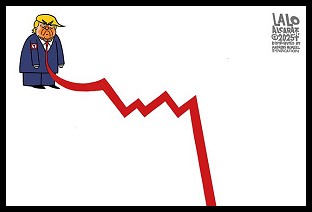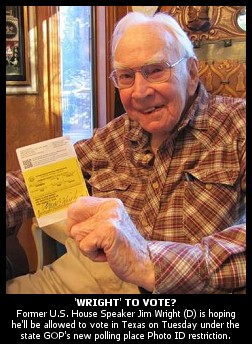(Or the VERY high profile GOPers who committed same)...
 On Tuesday, a Los Angeles County jury convicted California State Senator Roderick D. Wright (D) of false residency voter fraud, after finding that he lied about his address on voter registration and candidacy papers.
On Tuesday, a Los Angeles County jury convicted California State Senator Roderick D. Wright (D) of false residency voter fraud, after finding that he lied about his address on voter registration and candidacy papers.
Wright's crime was an elite form of voter fraud, which, along with almost all of the most prevalent forms of voter fraud, would not have been prevented by polling place Photo ID restriction laws.
The jury was not persuaded by Wright's claim that he resided in the Inglewood residence of his common law stepmother. Prosecutors presented extensive evidence that established that Wright resided in an "upscale Baldwin Hills neighborhood" that was outside the district. They found that, in addition to lying about his address on his voter registration and candidacy papers, he fraudulently voted in five elections.
As we have repeatedly explained, most recently in covering a recent judicial determination that Pennsylvania's Photo ID law violated that state's constitution, cases involving in-person voter impersonation by ordinary citizens --- the only type of voter fraud that can possibly be prevented by polling place Photo ID restrictions --- are about a scarce as hen's teeth. False residency, by contrast, is a form of voter fraud that has reached epidemic proportions amongst our political elites in both parties, especially, as Brad Friedman has tirelessly documented, amongst the very high-level Republicans who hypocritically call for Photo ID restrictions for everybody else.
Where millions of innocent Americans are at risk of disenfranchisement as a result of the phantom menace of in-person voter fraud, prosecutions of elite politicians for false residency voter fraud have been rare. In one of those rare instances, former Indiana Republican Secretary of State Charlie White was convicted in 2012 of three counts of felony false residency voter fraud. His conviction was particularly ironic, given that he was the chief election official in the first state in the nation to implement polling place Photo ID restrictions. Despite his felony voter fraud charges (and four others) White has not had to serve so much as a single day in jail. Wright, a Democrat, faces up to eight years in prison.
[Update 1/31/2014: Following a meeting by the Democratic caucus, California State Senate Leader Darrell Steinberg (D) announced that Wright will retain his seat pending appeal. However, the Democratic caucus, which sports a super-majority in the state Senate, removed Wright from his position as the Chairman of the Senate Governmental Affairs Committee.]
Here are just a few of the cases of false residency voter fraud we've documented over recent years, by some high-profile GOPers you will be very familiar with...
--- Click here for REST OF STORY!... ---
 Completely unnecessary polling place Photo ID restrictions enacted by so-called "small government conservatives" are costing taxpayers more and more big government money every day.
Completely unnecessary polling place Photo ID restrictions enacted by so-called "small government conservatives" are costing taxpayers more and more big government money every day. 

 Trump EPA Guts Enviro Justice Office: 'BradCast' 4/24/25
Trump EPA Guts Enviro Justice Office: 'BradCast' 4/24/25 'Green News Report' 4/24/25
'Green News Report' 4/24/25
 Nation's Largest Broadcaster Mandates News Outlets Hoax Viewers to Help Gut FCC Rules: 'BradCast' 4/23/25
Nation's Largest Broadcaster Mandates News Outlets Hoax Viewers to Help Gut FCC Rules: 'BradCast' 4/23/25 Trump's FCC on Precipice of Ending All Limits on Corporate Control of Local TV Stations
Trump's FCC on Precipice of Ending All Limits on Corporate Control of Local TV Stations GOP Earth Day 2025 Hypocrisies and Dilemmas: 'BradCast' 4/22/25
GOP Earth Day 2025 Hypocrisies and Dilemmas: 'BradCast' 4/22/25 'Green News Report' 4/22/25
'Green News Report' 4/22/25 Pope Francis Dies,
Pope Francis Dies, Sunday
Sunday  Sunday 'Zero Day' Toons
Sunday 'Zero Day' Toons Soc. Sec. Expert Warns DOGE Hastening Collapse, Privati-zation: 'BradCast' 4/10/2025
Soc. Sec. Expert Warns DOGE Hastening Collapse, Privati-zation: 'BradCast' 4/10/2025 'Green News Report' 4/10/25
'Green News Report' 4/10/25 Trump Blinks, Chaos Reigns, Markets Spike as Many Tariffs Remain Despite 90-Day 'Pause': 'BradCast' 4/9/25
Trump Blinks, Chaos Reigns, Markets Spike as Many Tariffs Remain Despite 90-Day 'Pause': 'BradCast' 4/9/25 SCOTUS Deportation Ruling Grimmer Than First Appears: 'BradCast' 4/8/25
SCOTUS Deportation Ruling Grimmer Than First Appears: 'BradCast' 4/8/25 'Green News Report' 4/8/25
'Green News Report' 4/8/25 Cliff Diving with Donald: 'BradCast' 4/7/25
Cliff Diving with Donald: 'BradCast' 4/7/25 Sunday 'Don't Look Down' Toons
Sunday 'Don't Look Down' Toons 'Green News Report' 4/3/25
'Green News Report' 4/3/25 'Mob Boss' Trump's Trade Sanctions Tank U.S., World Markets: 'BradCast' 4/3/25
'Mob Boss' Trump's Trade Sanctions Tank U.S., World Markets: 'BradCast' 4/3/25 Crawford Landslide in WI; Booker Makes History in U.S. Senate: 'BradCast' 4/2/25
Crawford Landslide in WI; Booker Makes History in U.S. Senate: 'BradCast' 4/2/25 Judge Ends Challenge to GA's Unverifiable, Insecure Vote System: 'BradCast' 4/1/25
Judge Ends Challenge to GA's Unverifiable, Insecure Vote System: 'BradCast' 4/1/25 Bad Court, Election News for Trump is Good News for U.S.: 'BradCast' 3/31
Bad Court, Election News for Trump is Good News for U.S.: 'BradCast' 3/31 Vets Push Back at Plan to Slash Health Care, 80K V.A. Jobs: 'BradCast' 3/27/25
Vets Push Back at Plan to Slash Health Care, 80K V.A. Jobs: 'BradCast' 3/27/25 Signal Scandal Worsens for Trump, GOP; Big Dem Election Wins in PA: 'BradCast' 3/26
Signal Scandal Worsens for Trump, GOP; Big Dem Election Wins in PA: 'BradCast' 3/26 'Emptywheel': Trump NatSec Team Should 'Resign in Disgrace': 'BradCast' 3/25/25
'Emptywheel': Trump NatSec Team Should 'Resign in Disgrace': 'BradCast' 3/25/25 USPS 'Belongs to the People, Not the Billionaires': 'BradCast' 3/24/25
USPS 'Belongs to the People, Not the Billionaires': 'BradCast' 3/24/25
 VA GOP VOTER REG FRAUDSTER OFF HOOK
VA GOP VOTER REG FRAUDSTER OFF HOOK Criminal GOP Voter Registration Fraud Probe Expanding in VA
Criminal GOP Voter Registration Fraud Probe Expanding in VA DOJ PROBE SOUGHT AFTER VA ARREST
DOJ PROBE SOUGHT AFTER VA ARREST Arrest in VA: GOP Voter Reg Scandal Widens
Arrest in VA: GOP Voter Reg Scandal Widens ALL TOGETHER: ROVE, SPROUL, KOCHS, RNC
ALL TOGETHER: ROVE, SPROUL, KOCHS, RNC LATimes: RNC's 'Fired' Sproul Working for Repubs in 'as Many as 30 States'
LATimes: RNC's 'Fired' Sproul Working for Repubs in 'as Many as 30 States' 'Fired' Sproul Group 'Cloned', Still Working for Republicans in At Least 10 States
'Fired' Sproul Group 'Cloned', Still Working for Republicans in At Least 10 States FINALLY: FOX ON GOP REG FRAUD SCANDAL
FINALLY: FOX ON GOP REG FRAUD SCANDAL COLORADO FOLLOWS FLORIDA WITH GOP CRIMINAL INVESTIGATION
COLORADO FOLLOWS FLORIDA WITH GOP CRIMINAL INVESTIGATION CRIMINAL PROBE LAUNCHED INTO GOP VOTER REGISTRATION FRAUD SCANDAL IN FL
CRIMINAL PROBE LAUNCHED INTO GOP VOTER REGISTRATION FRAUD SCANDAL IN FL Brad Breaks PA Photo ID & GOP Registration Fraud Scandal News on Hartmann TV
Brad Breaks PA Photo ID & GOP Registration Fraud Scandal News on Hartmann TV  CAUGHT ON TAPE: COORDINATED NATIONWIDE GOP VOTER REG SCAM
CAUGHT ON TAPE: COORDINATED NATIONWIDE GOP VOTER REG SCAM CRIMINAL ELECTION FRAUD COMPLAINT FILED AGAINST GOP 'FRAUD' FIRM
CRIMINAL ELECTION FRAUD COMPLAINT FILED AGAINST GOP 'FRAUD' FIRM RICK SCOTT GETS ROLLED IN GOP REGISTRATION FRAUD SCANDAL
RICK SCOTT GETS ROLLED IN GOP REGISTRATION FRAUD SCANDAL VIDEO: Brad Breaks GOP Reg Fraud Scandal on Hartmann TV
VIDEO: Brad Breaks GOP Reg Fraud Scandal on Hartmann TV RNC FIRES NATIONAL VOTER REGISTRATION FIRM FOR FRAUD
RNC FIRES NATIONAL VOTER REGISTRATION FIRM FOR FRAUD EXCLUSIVE: Intvw w/ FL Official Who First Discovered GOP Reg Fraud
EXCLUSIVE: Intvw w/ FL Official Who First Discovered GOP Reg Fraud GOP REGISTRATION FRAUD FOUND IN FL
GOP REGISTRATION FRAUD FOUND IN FL



















 Sure, Pennsylvania's Republican Governor Tom Corbett may be the dumbest in the nation, but the competition for that title is certainly fierce and tough to quantify.
Sure, Pennsylvania's Republican Governor Tom Corbett may be the dumbest in the nation, but the competition for that title is certainly fierce and tough to quantify. On Tuesday, a Los Angeles County jury
On Tuesday, a Los Angeles County jury  A number of unhappy "good government" groups will file a lawsuit against the Federal Election Commission next month, in hopes that the courts will force the FEC to enforce the federal campaign finance laws that the FEC is, supposedly, there to enforce.
A number of unhappy "good government" groups will file a lawsuit against the Federal Election Commission next month, in hopes that the courts will force the FEC to enforce the federal campaign finance laws that the FEC is, supposedly, there to enforce. Can't tell you how nice it is to see that people finally seem to be getting it. At least people on Reddit, where
Can't tell you how nice it is to see that people finally seem to be getting it. At least people on Reddit, where  A Pennsylvania Photo ID law that one Republican lawmaker once boasted would deliver the Keystone State to Mitt Romney in the 2012 Presidential Election was struck down by a Pennsylvania trial court.
A Pennsylvania Photo ID law that one Republican lawmaker once boasted would deliver the Keystone State to Mitt Romney in the 2012 Presidential Election was struck down by a Pennsylvania trial court. "True the Vote" (TTV), the Orwellian-named Republican "voter fraud" front group with a
"True the Vote" (TTV), the Orwellian-named Republican "voter fraud" front group with a  A federal District court judge has nixed a rightwing "voter fraud" group's Motion to Intervene on behalf of the state of Texas in the U.S. Dept. of Justice's lawsuit to block the Lone Star state's polling place Photo ID restriction law.
A federal District court judge has nixed a rightwing "voter fraud" group's Motion to Intervene on behalf of the state of Texas in the U.S. Dept. of Justice's lawsuit to block the Lone Star state's polling place Photo ID restriction law. Former U.S. House Speaker Jim Wright (D) was denied a Photo ID for voting purposes in Texas over the weekend by the state's Department of Public Safety (DPS).
Former U.S. House Speaker Jim Wright (D) was denied a Photo ID for voting purposes in Texas over the weekend by the state's Department of Public Safety (DPS). If you haven't been able to follow Reagan-appointed federal appellate court judge Richard Posner's stunning disavowal of his landmark 2007 polling place Photo ID law ruling - from
If you haven't been able to follow Reagan-appointed federal appellate court judge Richard Posner's stunning disavowal of his landmark 2007 polling place Photo ID law ruling - from  Okay. Now this is beginning to get completely absurd.
Okay. Now this is beginning to get completely absurd. Perhaps predictably, the Rightwing is now turning on the otherwise well-respected, Reagan-appointed appellate court judge who
Perhaps predictably, the Rightwing is now turning on the otherwise well-respected, Reagan-appointed appellate court judge who 













